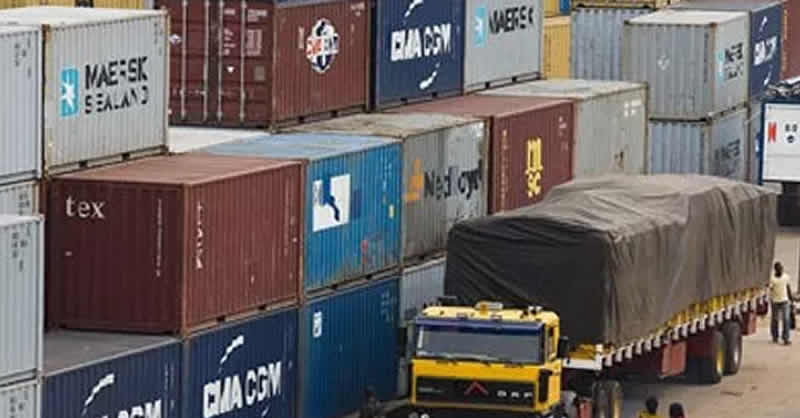Nigerian port users are losing millions daily in the form of demurrage due to the detention of about 6,386 import containers by various government agencies at the Lagos Port, The PUNCH reports.
This is even as port users, including shipping companies and terminal operators, accused some government agencies such as the Maritime Police, the National Drug Law Enforcement Agency, the National Agency for Food and Drugs Administration and Control, and the Nigeria Customs Service, among others, of incessant interference in cargo clearance processes and placement of detention orders on duly cleared import containers, thereby barring their exit from the port terminals.
These stakeholders stated this on Wednesday in Lagos during a workshop organised by the Nigerian Shippers’ Council in collaboration with the Nigeria Police Maritime Police Command on the role of the Police in the port. The event was themed, ‘Facilitating Port Efficiency: The Strategic Role of the Maritime Police’.
Giving the figures of the detained containers, representative of Five Star Logistics Terminal, Nnanna Kenneth, in data sighted by our correspondent, disclosed that a total of “6,386 import units/cargos currently remain under various forms of government agency restrictions and detention at the Five Star Logistics Yard,” stressing that the situation has continued to disrupt cargo flow and escalate disputes between clearing agents and terminal operators.
According to him, the Nigeria Police Maritime Command accounts for the largest number, with 2,000 containers blocked, followed by the NCS, which placed restrictions on 1,500 units of containers.
“The Department of State Services blocked 801 containers, NAFDAC blocked 1,162 containers, NDLEA blocked 639 units, while the Nigeria Agricultural Quarantine Service blocked 284 units, making a total of 6,386 containers blocked,” Kenneth mentioned.
Kenneth explained that these blocks, often triggered by written directives from the agencies, automatically halt the movement of all container units tied to a particular bill of lading.
“If all these containers are blocked, they will expect the terminal to give a waiver, which is not caused by the terminal. Now, assuming we have 50 containers in a particular Bill of Lading, then when the Police write to us, definitely all the containers in the Bill of Lading will be affected; they will be blocked in the system.
“So it becomes a problem for the agent to take delivery or clear the containers. So we are not saying that the police should not do their work, but there is a time factor that they have to do it. I want to appreciate the NSC for organizing these problems for us to look at the issues and find a way forward,” he stressed.
The Deputy Manager in charge of Imports at Mediterranean Shipping Company Nigeria Limited, Dimeji Gbadebo, identified maritime police investigations as a major source of delay, citing frequent stop-letters and long periods of container detention, sometimes stretching into weeks or months, with little or no feedback on the outcome of inquiries.
Gbadebo drew comparisons with global and regional ports, noting that Singapore completes clearance processes within 24 hours, while neighbouring Lomé operates a seamless seven-day system. He lamented that Nigeria still struggles to achieve timely clearance even within 21 days.
Gbadebo said the prolonged delays, often caused by extended investigations and administrative bottlenecks, expose importers and agents to significant financial and operational setbacks.
On his part, the Executive Secretary/Chief Executive Officer, NSC, Dr Pius Akutah, lamented that several reports brought to the attention of the council by stakeholders point to incessant interference in the cargo clearance processes and placement of detention orders on duly cleared cargoes, thereby barring their exit from the port terminals and intimidation of personnel of shipping line agencies and terminals.
Represented at the event by the Director, Regulatory Services Department at the NSC, Mrs Margaret Ogbonnah, Akutah said investigations carried out on the matter to ascertain the veracity of these claims, “It was in most cases confirmed that these practices are carried out by various police formations without the knowledge of the Assistant Inspector-General of Police.”
He said these interferences often disrupt cargo dwell time, increase demurrage and storage charges payable by consignees, and ultimately lead to an increase in the cost of doing business in Nigerian ports.
Akutah said this development led to robust engagement of the NSC with the Inspector General of Police to put a stop to these practices and to ensure adherence to process in matters of container detention and other port-related issues.
In his address, the Assistant Inspector-General of Police in charge of Maritime, Chinedu Oko, said the training is both timely and strategic. Oko, who was represented by the Assistant Commissioner of Police Administration, Ports Authority Police, Western Command, Olufikayo Fawole, appreciated the NSC’s consistent commitment to strengthening institutional collaboration, enhancing operational standards, and supporting law enforcement capacity within the maritime domain.
“Today’s training is both timely and strategic. As we gather under the theme, ‘Facilitating Port Efficiency: The Strategic Role of the Police,’ we are reminded that modern port security goes far beyond policing in the traditional sense. The efficiency of our ports (both Western and Eastern Commands) depends significantly on how effectively law enforcement interfaces with port operators, regulatory agencies, terminal managers, freight forwarders, shipping lines, and the wider supply-chain community,” Oko said.
Container detention refers to the period when an imported container remains in the terminal beyond the free days allowed for clearing and delivery. After those free days expire, the shipping line or terminal begins to charge detention fees or demurrage.















